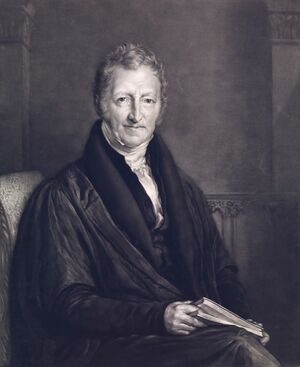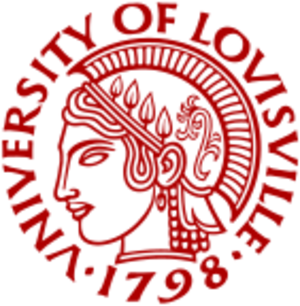Many thanks to our Patrons who cover ~2/3 of our hosting bill. Please join them if you can.
1798
Jump to navigation
Jump to search
1788 < 1789 < 1790 < 1791 < 1792 < 1793 < 1794 <1795 < 1796 < 1797 < 1798 > 1799 > 1800 > 1801 > 1802 > 1803 > 1804 > 1805 > 1806 > 1807 > 1808
 Thomas Malthus publishes the influential An Essay on The Principle of Population. "In his comfortable parsonage, he contemplated the misery of the great majority of mankind with equanimity, and pointed out the fallacies of the reformers who hoped to alleviate it." |
Events
- January – Eli Whitney contracts with the U.S. federal government for 10,000 muskets, which he produces with interchangeable parts.
- February 10 – The Pope is taken captive, and the Papacy is removed from power, by French General Louis-Alexandre Berthier.
- March – the Irish Rebellion of 1798 begins when the Irish Militia arrest the leadership of the Society of United Irishmen, a group unique amongst Irish republican and nationalist movements in that it unifies Catholics and Protestants (Anglican, Presbyterian, Methodist, Baptist and others) around republican ideals. This month, Lord Castlereagh is appointed Acting Chief Secretary for Ireland and on March 30 martial law is proclaimed here. The first battles in the rebellion are fought on May 24 and it continues through September, but the rebels receive much less than the expected support from France, which sends only 1,100 men.
- March 7 – French forces invade the Papal States and establish the Roman Republic.
- April 12 – The Helvetic Republic, a French client republic, is proclaimed following the collapse of the Old Swiss Confederacy after the French invasion; Aarau becomes the republic's temporary capital.
- April 26 – France annexes Geneva.
- June 12 The French take Malta.
- June 18 – The first of the four Alien and Sedition Acts, the Naturalization Act of 1798, is signed into law by U.S. President Adams, requiring immigrants to wait 14 years rather than five years to become naturalized citizens of the United States. On June 25, another law is signed authorizing the imprisonment and deportation of any non-citizens deemed to be dangerous.
- July 11 – The United States Marine Corps is re-established under its present name.
- July 14 – The fourth of the Alien and Sedition Acts, the Sedition Act of 1798 is signed into law, making it a federal crime to write, publish, or utter false or malicious statements about the United States government.
- July 21 – Battle of the Pyramids: Napoleon defeats Ottoman forces near the Pyramids.
- August 1 – Battle of the Nile (near Abu Qir): Lord Nelson defeats the French navy under Admiral Brueys. 11 of the 13 French battleships are captured or destroyed, including the flagship Orient whose magazine explodes; Nelson himself is wounded in the head.
- September 5 – Conscription is made mandatory in France by the Jourdan Law.
- September 23 – Battle of Killala: in the last land battle of the Irish Rebellion of 1798, British troops defeat the remaining rebel Irish and French forces at Killala.
- October 2 – The Cherokee nation signs a treaty with the United States allowing free passage through Cherokee lands in Tennessee through the Cumberland Gap through the Appalachian Mountains from Virginia into Kentucky.
- October 7 – U.S. Representative Matthew Lyon of Vermont becomes the first member of Congress to be put on trial for violating the new Sedition Act of 1798.
- October 12 - Battle of Tory Island: A British Royal Navy squadron, under Sir John Borlase Warren, prevents French Republican ships, commanded by Jean-Baptiste-François Bompart, from landing reinforcements for the Society of United Irishmen on the Donegal coast; Irish leader Wolfe Tone is captured and later dies of his wounds. This ends the Irish Rebellion of 1798.
- October 22 – Capitulation of the French garrison at Hyderabad to East India Company troops under James Kirkpatrick, British Resident.
- December 5 – Peasants War in the Southern Netherlands: The revolt is crushed in Hasselt; during the uprising it is estimated that 5,000 to 10,000 people have been killed.
Date unknown
- Edward Jenner publishes An Inquiry into the Causes and Effects of the Variolæ Vaccinæ, describing the smallpox vaccine, in London.
- Thomas Malthus publishes An Essay on the Principle of Population (anonymously) in London.
- Nathan Mayer Rothschild moves from Frankfurt in the Holy Roman Empire to England, settling up in business as a textile trader and financier in Manchester.
- Alois Senefelder invents lithography.
- The first census in Brazil counts 2 million blacks in a total population of 3.25 million.
Event
| Event | Start | End | Description |
|---|---|---|---|
| French Revolution | 5 May 1789 | 9 November 1799 | Often cited event in world history that has an even more brutal side to it than is usually discussed. |
New Groups
| Group | Image | Type | Description |
|---|---|---|---|
| Milton Academy |  | ||
| Netherlands/Ministry of Justice and Security |  | Ministry | Tries to arrest 200,000 citizens/year for missed payments while dealing with drug traffickers. Combating the Dutch drug syndicates leading the European illegal drug trade since the 1970s. Marvelous effectiveness. |
| University of Louisville |  | Public | High medical research activity |
Many thanks to our Patrons who cover ~2/3 of our hosting bill. Please join them if you can.